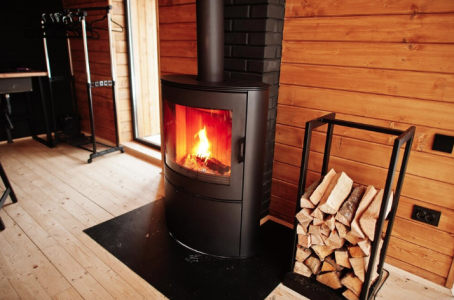BEWARE: Study reveals a hidden danger in Aussie homes and sparks outcry for a nationwide ban
By
VanessaC
- Replies 32
The humble wood heater, a staple in many Australian homes for its cosy warmth and rustic charm, has come under intense scrutiny following a recent study that has revealed a darker side to this traditional source of heat.
Researchers are sounding the alarm, claiming that these seemingly innocuous appliances could be responsible for up to 63 premature deaths per year in the Australian Capital Territory (ACT) alone.
This shocking revelation has led to calls for a nationwide ban on new wood heaters in urban areas and a gradual phasing out of existing ones.
The study, published in the Medical Journal of Australia, found that the number of deaths attributed to domestic wood heaters in the ACT each year was comparable to the estimated number of premature deaths in the territory due to the extreme smoke from the 2019-20 Black Summer bushfires.
It was estimated that wood smoke causes 269 premature deaths a year in the Sydney Greater Metropolitan Area and 65 deaths annually in Tasmania.
With these alarming figures, it's no wonder that the ACT has already moved to ban the heaters.
However, the study's findings have prompted its authors to urge environmental regulators and public health authorities in other states to follow suit.
The researchers measured the amount of microscopic particulates, known as PM 2.5, at three research stations in the capital, including Tuggeranong Valley, Belconnen and Central Canberra.
Long-term exposure can worsen respiratory conditions like asthma as the small particles can easily enter the bloodstream through the lungs.
It may also lead to a higher risk of heart attacks, strokes, and some types of cancer.
Their modelling found that during colder years (2017, 2018, and 2021), the higher number of these particulates in the air would likely be responsible for 17 to 26 premature deaths in the ACT.
During milder years (2016-2022), this figure dropped to 11 to 15 deaths.
However, using the least conservative approach, these estimates jumped to 43 to 63 deaths a year during colder years and 26 to 36 deaths annually during the milder years.
The estimated costs of these deaths ranged from $57 million to $333 million.
Fay Johnston from the Menzies Institute for Medical Research co-authored the study and emphasised the urgent need for policies to address the dangers of wood heater use.
'They're highly polluting, which means only a few of them can affect entire neighbourhoods,' she explained.
'Policies to improve air quality, including addressing the burden that comes from wood heaters, are important all around Australia.'
Wood smoke is a particularly dangerous form of air pollution because wood heaters burn wood under highly variable conditions.
The wood undergoes what is known as 'incomplete combustion', which then leads to more dangerous by-products.
'There are increasing risks to wood heater owners, in addition to the burden on the community from pollution in general,' she added.
'Some very big recent studies from the United States found higher rates of cancer, for example, in people who use wood heaters even seasonally.'
Wood heater use and impact differ greatly across the nation.
Around 2.7 million Australians have asthma, and one in four of them can be triggered by smoke, with 455 dying nationally in 2022 from their asthma.
In NSW, about 10 per cent of homes use wood heaters for heating. However, towns such as Armidale use it extensively.
In Sydney, 24 per cent of wintertime air pollution comes from 4 per cent of homes that use wood heaters.
Furthermore, a government inquiry in Victoria in 2021 found wood heating as one of the 'significant contributors' to air pollution in built-up areas and has made recommendations for reform.
'It's the cumulative effect of the hundreds of thousands of chimneys that are going throughout a city,' Professor Johnston said.
Topography also reportedly played a significant role in the impact of wood smoke. Case in point, lower-lying town centres in Launceston and Armidale in NSW accumulated smoke more easily.
The ACT government is reportedly working on phasing out household wood heaters by 2045 except in rural areas.
It came after Sophie Lewis, the ACT Commissioner for Sustainability and the Environment, reported that there was 'no safe level of air pollution for human health' and the heaters had no place in the territory’s renewables future.
It was estimated that around 40,000 wood heaters are sold in Australia each year and are being used in almost 900,000 homes.
New-model woodfire heaters are also said to have lower emissions.
 What are your thoughts on this issue? Have you experienced health issues due to wood smoke pollution? Share your experiences and thoughts in the comments below.
What are your thoughts on this issue? Have you experienced health issues due to wood smoke pollution? Share your experiences and thoughts in the comments below.
Researchers are sounding the alarm, claiming that these seemingly innocuous appliances could be responsible for up to 63 premature deaths per year in the Australian Capital Territory (ACT) alone.
This shocking revelation has led to calls for a nationwide ban on new wood heaters in urban areas and a gradual phasing out of existing ones.
The study, published in the Medical Journal of Australia, found that the number of deaths attributed to domestic wood heaters in the ACT each year was comparable to the estimated number of premature deaths in the territory due to the extreme smoke from the 2019-20 Black Summer bushfires.
It was estimated that wood smoke causes 269 premature deaths a year in the Sydney Greater Metropolitan Area and 65 deaths annually in Tasmania.
With these alarming figures, it's no wonder that the ACT has already moved to ban the heaters.
However, the study's findings have prompted its authors to urge environmental regulators and public health authorities in other states to follow suit.
The researchers measured the amount of microscopic particulates, known as PM 2.5, at three research stations in the capital, including Tuggeranong Valley, Belconnen and Central Canberra.
Long-term exposure can worsen respiratory conditions like asthma as the small particles can easily enter the bloodstream through the lungs.
It may also lead to a higher risk of heart attacks, strokes, and some types of cancer.
Their modelling found that during colder years (2017, 2018, and 2021), the higher number of these particulates in the air would likely be responsible for 17 to 26 premature deaths in the ACT.
During milder years (2016-2022), this figure dropped to 11 to 15 deaths.
However, using the least conservative approach, these estimates jumped to 43 to 63 deaths a year during colder years and 26 to 36 deaths annually during the milder years.
The estimated costs of these deaths ranged from $57 million to $333 million.
Fay Johnston from the Menzies Institute for Medical Research co-authored the study and emphasised the urgent need for policies to address the dangers of wood heater use.
'They're highly polluting, which means only a few of them can affect entire neighbourhoods,' she explained.
'Policies to improve air quality, including addressing the burden that comes from wood heaters, are important all around Australia.'
Wood smoke is a particularly dangerous form of air pollution because wood heaters burn wood under highly variable conditions.
The wood undergoes what is known as 'incomplete combustion', which then leads to more dangerous by-products.
'There are increasing risks to wood heater owners, in addition to the burden on the community from pollution in general,' she added.
'Some very big recent studies from the United States found higher rates of cancer, for example, in people who use wood heaters even seasonally.'
Wood heater use and impact differ greatly across the nation.
Around 2.7 million Australians have asthma, and one in four of them can be triggered by smoke, with 455 dying nationally in 2022 from their asthma.
In NSW, about 10 per cent of homes use wood heaters for heating. However, towns such as Armidale use it extensively.
In Sydney, 24 per cent of wintertime air pollution comes from 4 per cent of homes that use wood heaters.
Furthermore, a government inquiry in Victoria in 2021 found wood heating as one of the 'significant contributors' to air pollution in built-up areas and has made recommendations for reform.
'It's the cumulative effect of the hundreds of thousands of chimneys that are going throughout a city,' Professor Johnston said.
Topography also reportedly played a significant role in the impact of wood smoke. Case in point, lower-lying town centres in Launceston and Armidale in NSW accumulated smoke more easily.
The ACT government is reportedly working on phasing out household wood heaters by 2045 except in rural areas.
It came after Sophie Lewis, the ACT Commissioner for Sustainability and the Environment, reported that there was 'no safe level of air pollution for human health' and the heaters had no place in the territory’s renewables future.
It was estimated that around 40,000 wood heaters are sold in Australia each year and are being used in almost 900,000 homes.
New-model woodfire heaters are also said to have lower emissions.
Key Takeaways
- A study in the Medical Journal of Australia indicates wood heaters contribute to premature deaths in the ACT, with estimates reaching up to 63 deaths annually during colder years.
- Long-term exposure to particulates emitted from wood heaters exacerbates respiratory conditions such as asthma and increases risks of heart attack, strokes, and some cancers.
- Researchers called for a ban on new wood heaters in urban areas and a phase-out of existing ones due to their significant health and environmental impacts.
- The ACT government plans to phase out household wood-fired heaters by 2045, except in rural areas, and there are suggestions for nationwide action to address wood heater pollution.








